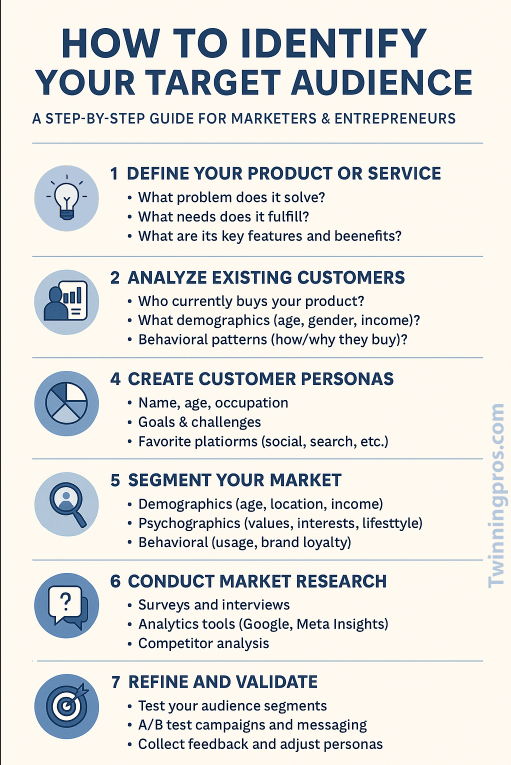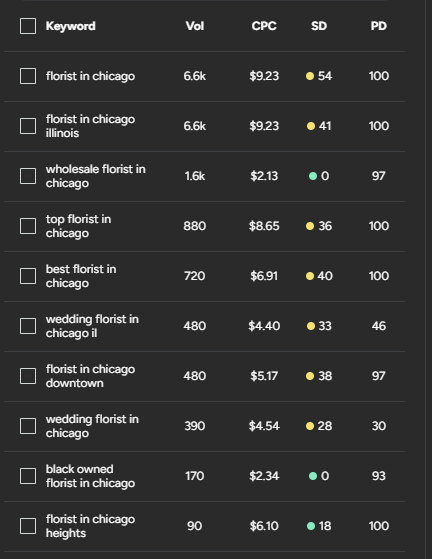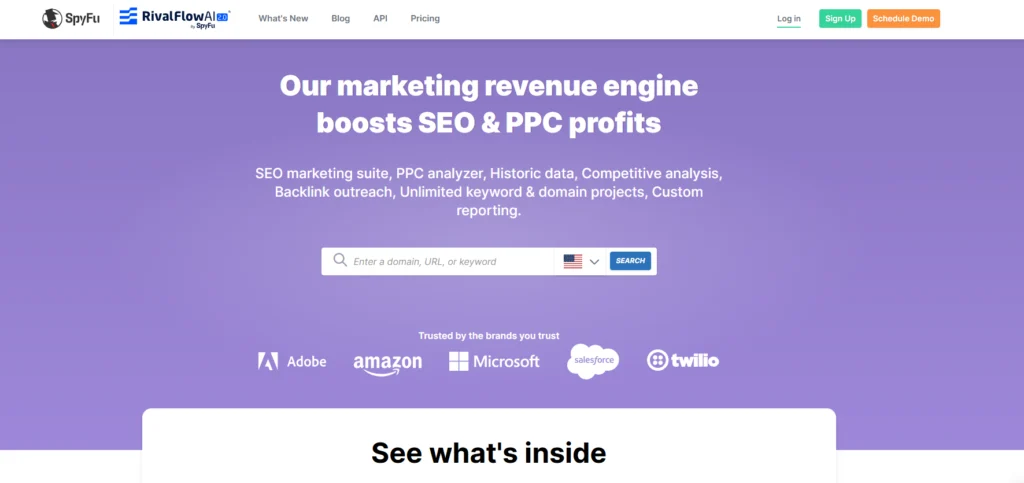Struggling to get your small business noticed online? The secret to driving traffic and attracting the right customers is in your keyword research. Keywords are the foundation of search engine optimization (SEO) and can make or break your online visibility. But many small business owners don’t know where to start when it comes to finding the right keywords, which leads to missed opportunities in search engine rankings.
In this post, we’ll break down the keyword research process into simple steps, helping you find the best keywords to target so you can boost your website’s visibility, drive traffic, and attract more customers.
Table of Contents
Why Keyword Research is Crucial for Small Businesses
Keywords are what connect your business to the people who are searching for products or services like yours online. By conducting keyword research, you’re essentially figuring out what terms your potential customers are using and how to position your content to appear in those searches.
Without proper keyword research, your site may end up ranking for irrelevant terms or fail to reach your target audience altogether. By the end of this post, you’ll know how to conduct keyword research that drives targeted traffic and attracts the right customers to your website.
For more insights into SEO for small businesses, check out our post on What is SEO and Why It Matters for Small Businesses.
Steps to Conduct Keyword Research for Your Small Business
Identify Your Business Goals and Target Audience
Before you dive into keyword research, it’s important to understand your business goals and who your target audience is. Knowing what you want to achieve, whether it’s more leads, sales, or brand awareness, will guide your keyword strategy.
How to do it: Define your target audience’s needs, pain points, and the specific products or services they’re searching for. This will help you choose the right keywords that align with both your business and your potential customers.

Brainstorm Seed Keywords
Seed keywords are the broad terms related to your business that serve as the foundation for more specific, long-tail keywords. These are the basic words and phrases that describe your products or services.
How to do it: Make a list of broad terms related to your business. For example, if you’re a florist in Chicago, your seed keywords might be “florist,” “flower delivery,” or “wedding flowers.”

Use Keyword Research Tools
Keyword research tools can help you refine your list of seed keywords by providing data on search volume, competition, and additional keyword suggestions.
How to do it: Use tools like Google Keyword Planner, Ubersuggest, Ahrefs, or SEMrush to find relevant keywords with high search volume and low competition. These tools will help you identify the best keywords to target for your business.
To learn more about effective tools for improving your SEO, check out our post on Why Google Analytics is a Must-Have Tool for Small Businesses

Analyze Competitor Keywords
Looking at what your competitors are doing can give you insights into valuable keywords that you may be missing. Understanding which keywords your competitors rank for can help you uncover opportunities to target the same terms or find untapped keyword niches.
How to do it: Use tools like SemRush or SpyFu to analyze competitor websites and see which keywords they’re ranking for. Focus on the terms that are driving traffic to their sites and assess whether those keywords make sense for your business.

Focus on Long-Tail Keywords
Long-tail keywords are more specific, often longer phrases that typically have lower competition but higher conversion rates. They’re great for attracting qualified, ready-to-buy visitors.
How to do it: Look for longer, more specific search phrases such as “affordable wedding florist in Chicago” rather than just “florist.” Long-tail keywords often reflect buyer intent and can lead to higher conversion rates.
For more details on how to boost your rankings with effective keyword strategies, see our post on A Beginner’s Guide to SEO: 5 Things You Need to Know.

Evaluate Keyword Difficulty and Search Volume
Not all keywords are worth targeting. The best keywords have a balance between high search volume and low competition, making them easier to rank for and more likely to bring in qualified traffic.
How to do it: Use keyword research tools to assess the difficulty score of each keyword. Focus on keywords with moderate search volume and lower competition to give yourself the best chance of ranking.
Optimizing Your Website with the Right Keywords
Now that you’ve identified your target keywords, it’s time to put them to work on your website.
Use Keywords in Strategic Places
Search engines look for keywords in specific places on your website, including the page title, meta description, headers, and body content.
How to do it: Incorporate your primary keyword in your page title and meta description, and use related keywords naturally throughout the body of your content. This helps search engines understand the relevance of your page and rank it higher for the target terms.
Optimize for Local Search
If you’re a small business that relies on local customers, optimizing for local search is essential. Local SEO helps you rank for location-based keywords, such as “plumber in Seattle” or “coffee shop near me.”
How to do it: Use local keywords in your content and ensure your Google Business Profile is up-to-date. This will help your business show up in local search results, attracting nearby customers.
Create High-Quality Content Around Your Keywords
Simply adding keywords to your website won’t get you far. To truly rank higher, you need to create high-quality content that provides value to your audience.
How to do it: Focus on answering your customers’ questions and addressing their needs. Use your keywords naturally in blog posts, product pages, and landing pages, but avoid keyword stuffing, which can hurt your rankings.
For more tips on on-page optimization, check out our post on On-Page SEO: Simple Tips to Boost Your Website’s Search Engine Rankings
Common Keyword Research Mistakes to Avoid
While keyword research is essential, there are a few common mistakes to watch out for:
- Targeting only high-volume keywords: High-volume keywords are often highly competitive, making them difficult to rank for. A mix of high-volume and long-tail keywords will yield better results.
- Ignoring long-tail keywords: Long-tail keywords may have lower search volume, but they often bring in more qualified, ready-to-buy visitors.
- Forgetting to update your keyword strategy: SEO isn’t a one-time task. Search trends change over time, so it’s important to regularly review and update your keyword strategy to stay relevant.
For more tips on avoiding SEO mistakes, check out our post on 7 Common Mistakes You Are Making With Your Website and How to Fix Them.
How Keyword Research Boosts Your SEO and Attracts More Customers
Conducting thorough keyword research is the foundation of a successful SEO strategy. Here’s how it helps:
- Improves search visibility: Targeting the right keywords increases your chances of showing up in relevant search results, bringing in more potential customers.
- Drives qualified traffic: By focusing on keywords that your ideal customers are searching for, you can attract visitors who are actively looking for what you offer.
- Boosts conversions: Keywords that reflect buyer intent (such as long-tail keywords) bring in visitors who are more likely to convert into paying customers.
Twinning Pros Tip: Regularly review your keyword strategy to ensure your website stays competitive in search results. As search trends change, updating your keywords can help you maintain and improve your rankings.
For more advice on how keyword research fits into a larger SEO strategy, visit our post on SEO and SEM: Boost Your Online Marketing Efforts
Conclusion: Start Your Keyword Research Today
Keyword research is the key to unlocking the full potential of SEO for your small business. By targeting the right keywords, you can increase your search visibility, drive more traffic, and grow your customer base.
Need help finding the right keywords for your small business? Contact Twinning Pros today for a free consultation, and let us help you develop a winning SEO strategy that drives results!
Frequently Asked Questions
What is keyword research and why does it matter?
It’s the process of discovering the words people use to find what you offer, then using those terms naturally in prominent places (title, H1, headings, alt text, link text) so Search can understand and match your page.
Where can I find reliable keyword ideas for free?
Start with Google tools: Search Console’s Performance report (queries you already show for), Google Ads Keyword Planner (volumes/forecasts), and Google Trends (interest over time and by region).
How should search intent guide my choices?
Choose keywords that align with what people actually want (learn, compare, buy, local). Create people-first content that answers those needs clearly and completely.
Head terms vs. long-tail keywords—which should I target?
Use a mix. Head terms can bring reach; long-tail phrases capture specific intent and are often easier to win. Validate with Trends and your own Search Console data.
How many keywords should I target per page?
Focus on one primary topic with closely related variants. Avoid “keyword stuffing”—repeating terms unnaturally is against Google’s spam policies.
Where should I place my primary keyword?
Use natural language in the <title>, H1, subheadings, intro, body, and relevant alt/link text. Make each page’s title unique and descriptive.
Does Google use the meta keywords tag?
No. Google ignores the keywords meta tag.
How do I evaluate keyword difficulty without a paid tool?
Check the live results: who ranks now, page types (guides, product pages), depth/quality, and whether you can create something more helpful. Use Search Console to spot terms where you already have impressions but low CTR/position.
How often should I revisit my keyword research?
Periodically. Topics and demand shift. Review queries and pages in Search Console and sanity-check seasonality/interest with Trends.
What writing style works best for ranking pages?
Write naturally for people (not for percentages). Google recommends helpful, reliable, people-first content and warns against keyword stuffing.
SEO for Beginners
Learn from the SEO Strategist who has 75+ first page Google rankings under her belt.
We’re marketing nerds and business strategists that have generated millions of dollars in client revenue. We're sharing the systems and strategies to help your growing business with marketing that actually converts.
We're Tiffany + Tabatha

Comments